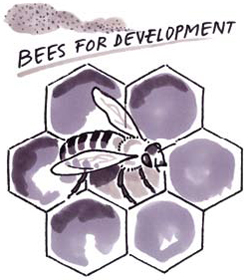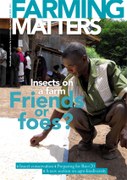Honey is probably the first association that comes to mind when we hear the word “bee”. Humans’ appreciation of this sweet product goes back thousands of years. Yet, in a recent conversation with Elizabeth McLeod, Project Officer at Bees for Development, she reminded us of at least two aspects of bees that people often tend to forget. Firstly, bees can be an important source of income for many people, especially in developing countries. Secondly, these black and yellow striped insects are the major pollinators of flowering plants, which means that they are essential for conserving biodiversity.

Bees for Development is an organisation that works to overcome this lack of attention. Describing itself as “the hub of a network of beekeepers all around the world”, it encourages and promotes sustainable apiculture, and particularly focuses on poor and rural areas.
Bees for Development has developed a series of educational and training programmes that facilitate the spread of knowledge about bees and profitable and sustainable beekeeping methods: practices that increase beekeepers’ incomes without jeopardising bee populations and local biodiversity.
“Our organisation’s view”, Mrs McLeod says, “is that the most important thing for beekeepers is information”. The organisation has developed a huge, free-to-use, online database about all aspects of bees and sustainable beekeeping – their “Information Portal”. But, as we all know, the best way to learn is by doing. Mrs McLeod explains that “what commonly happens is that an experienced beekeeper is approached by others who want to get involved”.
Bees for Development also support training, workshops and meetings, offering Resource Boxes (packs of explanatory material such as booklets, posters and the Bees for Development Journal), the content of which can be varied according to the needs and purposes of those taking and running the trainings.
Bees for Development was founded in 1993 in Monmouth, South Wales, U.K. The standard price for Resource Boxes is £50, but those who cannot afford it can receive a Sponsored Resource Box free of charge. Further information about all the current initiatives of the organisation is available at www.beesfordevelopment.org.
Mrs McLeod went on to emphasise that the training activities also aim to stimulate and strengthen beekeeper organisations: “When beekeepers can organise themselves into co-operatives or collective marketing groups, they can improve the terms of trade with other people. This is a significant element of our training: teaching people how to form effective associations to represent their own interests”.
This is all crucial for beekeepers, as demonstrated in a recent training programme in Uganda: “When we got to Kampala we noticed that, notwithstanding the presence of many local beekeepers who produce excellent honey, the majority of what is consumed has been imported. The issue in Uganda is that producers cannot meet their national market”.
Bees for Development started working with a co-operative, providing trainings for local beekeepers. “Now, we can proudly say that the co-operative we were working with has been invited by a supermarket supplier in Uganda to start supplying their stores and even to export to Kenya. Their produce is being very well received.”
Text: Nicola Piras
Illustration: Fred Geven

